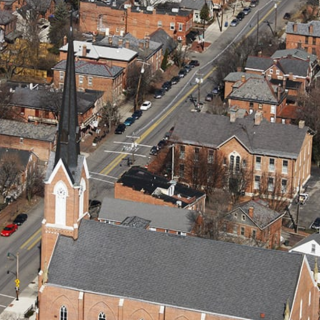Leaders of Everyday People for Positive Change announce their support for the Fraternal Order of Police Capital City Lodge #9’s recent vote of “no confidence” in Columbus elected officials. Jonathan Beard, a resident of Franklin Park, the Ward 55-elected Central Committee member of the Franklin County Democratic Party and chair of Everyday People, stated: “We come at this from very different perspectives – on one issue we differ dramatically from the FOP: to a person we believe Officer Rosen deserved to be fired for his continuing abuses of power. However, we stand in 100 percent unity with FOP Capitol City Lodge #9 in the belief that our city council does not deserve the confidence of the Columbus public.”
Beard added, “While the police union is concerned about protecting the interests of its member, our group is interested in protecting the civil rights of Columbus citizens, which our city council is working to diminish. In this case, we have a city council that is unanimous in its support for racially-discriminatory at-large elections – a form of election that the NAACP Legal Defense Fund (LDF) has warned has a high possibility of being unlawful and that has been disbanded in every other big city across the country.”
“The LDF issued a FAQ to Columbus after the defeat of Issue 1 in last August’s Special Election, saying ‘since the passage of the Voting Rights Act in 1965, numerous at-large voting systems have been struck down under Section 2 of the Voting Rights Act. Although at-large voting is becoming rarer and rarer, in part due to the advocacy of LDF and other civil rights organizations, such discriminatory election systems remain in some places in our democracy.’ However, despite that warning, our council – led by an African American member of council (Shannon Hardin) and a candidate for City Attorney (Zach Klein) – stood at the brink of voting to put an expanded racially-discriminatory system on the ballot for a vote, and has refused to rule out an expansion of racially discriminatory at-large voting.”
Willis Brown, President of the Bronzeville Neighborhood Association, a Near East Area Commissioner and the Ward 7-elected Franklin County Democratic Party Central Committee member, noted that “While some marched with tiki torches around a statue in Charlottesville, here in Columbus we have city officials undermining the clear intent of the Voting Rights Act of 1965, which the NAACP Legal Defense Fund told Columbus ‘widely considered the crown jewel of American democracy, the Voting Rights Act is the most effective tool for protecting voters of color against methods of election – like at-large voting – that weaken the voting strength of communities of color.’ But In Columbus, we have Black and White elected officials determined to preserve and ready to expand this racially discriminatory form of election – one that has been rejected by every other big city in America.”
Everyday People believe that the reason for this rejection is the unholy alliance between big business, corporate cash and our politicians. The group explains that at-large (city-wide) elections make it too expensive for candidates who are not hand-picked and corporate supported to win office, and the business leaders are only too happy to give money to politicians who continue to cut taxes for the rich. The group says we have class warfare, where the rich are getting obscene property tax abatements while the rest of us bear the full costs of city and county property tax-funded services. There is no reason why million dollar condos and new developments for the affluent in Columbus’s hottest real estate markets get tax abatements, but renters and homeowners of average priced homes pay our full taxes.
Everyday People seeks to end this pay-to-play system here in Columbus – where the rich give campaign contributions and get policy outcomes to favor the wealthy – but council is fighting citizen efforts to do so. In 2004, voters authorized a charter amendment to allow for caps on campaign contributions, but council never enacted an ordinance to do so.
Brown says “We will be going to this site (the McNabb Funeral Home site, 818 E. Long Street), because it is a place where Black history was demolished by the city, and where campaign contributions appear to be rewarded with city favor. We have been demonstrably and literally ‘sold out’ at this site. Here, Boyce Safford, the former city development director who had in 2009 told minority contractors they need to ‘play the game’ and make political contributions to get city work, who now runs a city-funded nonprofit development group (Next Generation Development Corp), got $2.5 million in city funds to buy real estate in September 2016.”
“On November 3rd, Next Generation bought the McNabb site, and then money started to flow to elected officials: from January through March, developer Doug Borrer contributed $4,000 to councilwoman Priscilla Tyson, and in the next two months $10,000 to Mayor Andrew Ginther and $4,000 to councilman Zach Klein. In June he added $500 to council woman Jaiza Page, and despite community opposition, the historic Adelphi Bank building on the site was demolished by the city. On July 18th, Chinedum Ndekwe – who runs a Cincinnati-based development company – contributed $5,000 to Mayor Ginther, his first contribution ever to a Columbus campaign account, and 11 days later Borrer and Ndekwe were awarded co-development rights to the city-owned site. Everyday People believes it is a clear case of pay-to-play that launders taxpayer dollars and public resources into campaign contributions.”
Brown said, “If it looks like a duck, walks like a duck, and quacks like a duck – it’s a duck! Next Generation was supposed to have worked with the community to develop a plan for this site before engaging developers, but once the campaign contributions started flowing the city ignored our input, demolished an important historic building, and gave the wealthy developer/contributors a green light to do what they want – rolling over the everyday people in our neighborhood. This type of shake-down or palm-greasing is crooked, and does not build public trust in government. Everyday People for Positive Change is proposing electoral system reforms, but the council is seeking to block us in moving forward and addressing campaign finance reform in our proposal.”
Beard added, “In their effort to unlawfully block us from the ballot, the council is ignoring Ohio Supreme Court decisions and saying that how we elect members to council and how they finance their elections do not have a ‘reasonable relationship’ to each other and thus cannot be presented in the same ballot issue – despite a long line of case law saying exactly the opposite. They are violating our constitutional right of referendum to maintain their access to the cash cow of wealthy individual and corporate political contributions and preparing to make us sue them to get the ballot access that is our right.”
“The fact that council’s seeming unlawful opposition to a citizen initiative is led by a candidate for City Attorney, Zach Klein, and that not a single council member sees a ‘reasonable relationship’ – which is the Ohio Supreme Court’s standard on single subject – between how we elect council members and how they finance their campaigns makes this all the more troubling and cements our vote of ‘no confidence’ in our current Columbus elected officials, in alignment with the vote of the Fraternal Order of Police.”
Everyday People for Positive Change joins the call to reform campaign being championed locally by Move To Amend-Columbus, which seeks a constitutional amendment to allow for the regulation of campaign financing. Sandy Bolzemius, of MTA says “…all across America, people have lost faith in government and corporation-owned elected officials. It doesn’t matter what level of government: federal, state, or local – the issues are the same. Move to Amend seeks to amend the U.S. Constitution, to firmly establish that money is not speech, and that human beings, not corporations, are persons entitled to constitutional rights. Everyday People seek to amend the Columbus city charter to accomplish the same end locally. Citizens must demand the changes that will serve us best.”
Doug Todd, Founder and President of We The People of Central Ohio says “We The People of Central Ohio wholeheartedly endorse and support the actions of Everyday People for Positive Change to overcome and contest efforts by the City of Columbus to deny their organization ballot access for an electoral reform proposal that includes caps on contributions to political campaigns.”
Everyday People has sent a brief survey with seven “yes” or “No” checkboxes to each council member, to see if any member of council is willing to publicly stand up for the civil rights of Columbus citizens, or if they will – to a person – ignore the survey as is expected. Beard explained, “Our city council members do not make public statements until they are told what to say and do. Though we have requested members respond by September 8th, we do not expect a single member of council to respond to our short survey of their understanding and perspectives. Unfortunately we have a council of seven members who all share one mind, which is why we seek to replace this repressive form of government with one that puts the interests of everyday people first. We look to move from the sad situation where we declare “no confidence” in our city council, and build a responsive, people-focused government that citizens can support proudly.”
Everyday People for Positive Changelists their calls to action:
1) All individual council members must publicly affirm within 10 days our right to present our ballot issue to include caps on campaign contributions and limits on the accumulation of campaign funds, without impediment by city council, and
2) We urge voters to reject ballot candidates who refuse to honor our constitutional right to present to the ballot referenda of our choice, and
3) We encourage citizens to learn more about, and join in support of, our plan to restore public trust in Columbus City government at meetings beginning next month:
Tuesday, September 5, 6:00, MLK Library, 1500 E. Long Street
Wednesday, September 6, 6:00, Linden Library, 2230 Cleveland Avenue



